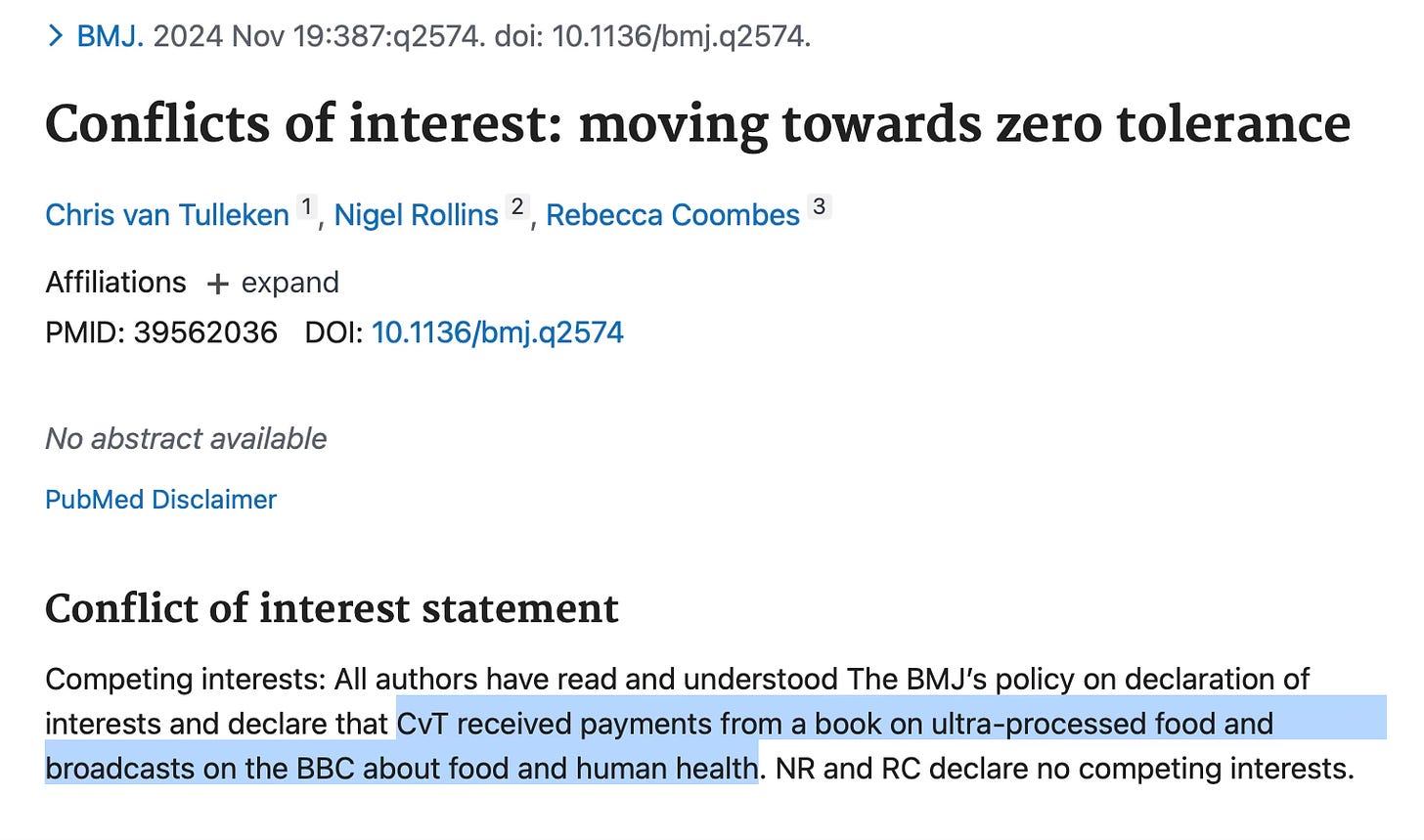I was pinged the most recent publication from Chris van Tulleken last week, the guy who hates just about everything about ultra-processed foods and the companies producing them. The publication was titled ‘Conflicts of interest: moving towards zero tolerance’. He says in this article that, just like researchers now treat the tobacco industry, they (along with health professionals and academic institutions) should no longer accept funding from other industries that lack the motive to improve public health, such as the food industry. He says that conflicts of interest create a bias that favours the profitability of the industry and probably harms people. This bias might be conscious or unconscious through the lens of the researcher, and may come into effect when developing research hypotheses, selecting experimental and analytic methods, and interpreting and presenting data.
However, when reading Chris’ publication, I was rather confused as to why he only considered a conflict of interest to be accepting an industry paycheck. That’s a big one, of course, but I’d have thought Chris would know that conflicts of interest are more than a few bucks from Kellogg’s. Chris should know this more than anyone, in fact, since (rather hilariously) he had to write his own conflicts of interest statement in order to publish this opinion piece stating that we must adopt a zero tolerance approach to conflicts of interest. Plain in sight under the title reads ‘[Chris van Tulleken'] received payments from a book on ultra-processed food and broadcasts on the BBC about food and human health’. He might not have received industry payment, but he has certainly built a career off a scientific hypothesis (regarding the harms of ultra-processed food) and has been paid decent money to publish and speak about evidence in favour of his hypotheses. So unless he is trying to cancel culture himself from the world of science, I’m not sure how he can possibly think this zero tolerance approach is in any way reasonable.
What’s more, I’d actually argue the primary conflict of interest in nutrition science is not a financial one. I’d confidently now place secondary, non-financial conflicts of interest on a pedestal above, which encompasses all factors that are relationship-based (e.g., personal or professional friendships or rivalries), belief-based (e.g., intellectual commitments and political, philosophical or religious viewpoints), and career-based (e.g., the desire for career advancement or recognition).
The reason I hold this position is in part because I consider the prospect of fame at least as seductive as the prospect of fortune. Even without an industry paycheck, researchers fight for a chance to be published in high-impact journals, they crave invites to speak at fancy conferences, and they relentlessly bug their superiors for a promotion or a higher salary due to their academic record. In addition, as we see more and more researchers battle for a primetime spot in the public eye, such as on social media, they inevitably desire to be known as ‘the guy/gal’ when it comes to a particular research topic. Unfortunately, the power of ego does not wait outside the laboratory door; it fuels investigative zeal, intellectual passion and dreams of advancing medical/nutrition knowledge, all of which, when pushed to the limit, undermine objectivity.
The other reason I hold this position is because research bias doesn’t always stem from what can be gained; just as frequently, it stems from fears of what could be lost. This relates to a cognitive bias known as loss aversion, which posits that the pain of loss is more powerful psychologically than the joy of gain. (with some evidence to back), such that people put in at least as much effort to avoid pain as they will to access joy. What sort of loss am I referring to here? Well, the uncomfortable feeling of having to accept you’re wrong, which for many researchers could involve having to ditch hypotheses they’ve held so tightly for decades.
I spoke to Gary Taubes a couple of years back, for example, who is the journalist who built a career off saying carbohydrates are the cause of obesity. In our chat, I straightforwardly asked him whether he feels capable of putting bias aside when assessing scientific evidence, given his entire career and reputation rests on convincing people that his scientific hypothesis is correct? What he replied was super interesting. He said that “being wrong would be a knock on my life's work, just as it would be with any scientist…the very essence of my job is to continue investigating a controversial issue until I come to a conclusion about which side, if any, is right. If I conclude wrongly, I have done my job poorly and I cannot trust my judgment and so cannot continue doing my job. There's no escaping this conclusion.” Gary’s honesty here provided me with additional clarity that conflicts of interest are not just financial, they are very much personal.
In any case, arguing for a zero tolerance approach to conflicts of interest is a pipe dream, in my opinion. Not only does most high-quality science depend on the financial input of industry, but conflicts of interest go far beyond money. Researchers will always have relationship-based, belief-based, and career-based conflicts of interest that affect their scientific objectivity. These are natural human experiences that will not be erased, regardless of how much industries dig their claws into the world of science.






It feels like I already knew about personal conflicts of interest, but this article made me realize they are more relevant than I previously thought.